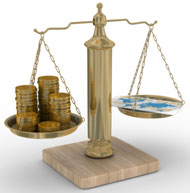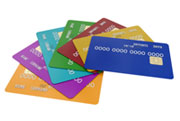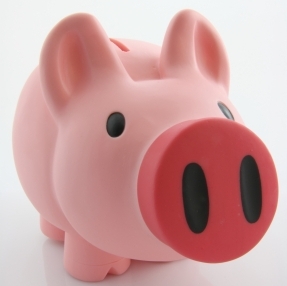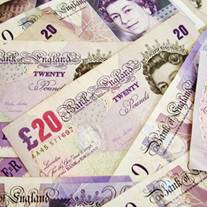 Borrow £3,000 at age 21 and you'd be 50 before it was clear! That's the case if you just make minimum credit cards payments - their evil genius can lock you in perpetual debt, boosting bank's profit astronomically.
Borrow £3,000 at age 21 and you'd be 50 before it was clear! That's the case if you just make minimum credit cards payments - their evil genius can lock you in perpetual debt, boosting bank's profit astronomically.
This full fight-back plan includes the updated Minimum Repayment Calculator, which reveals card-by-card the huge cost and length of sticking to the minimum, plus how much you'll save by fixing the amount you pay.
Step-by-step guide
Money Management Checklist
Minimum Repayments: Back to Basics
Unlike mortgages and loans, with credit cards you choose what you repay; the more you pay the faster the debt disappears. The only restriction is the prescribed minimum repayment, the lowest amount you must repay each month to avoid a fine.
This isn't a fixed amount - it is usually a percentage of the balance - so the amount you repay each month will fall as your balance reduces, meaning it takes longer to clear. The longer you borrow for, the more interest you're charged as 20% APR means you're charged 20% of your outstanding debts EVERY year (see the Interest Rates Beginners Guide)
In a nutshell the quicker you repay, the less it costs.
This means it's in companies interests to set minimum payments low, keeping you in debt for longer, and repaying more.
How will the new rules affect me?
 For all credit card applications from 1 April 2011 repayments must be at least 1% of the balance plus that month's interest, any default charges and the annual fee
For all credit card applications from 1 April 2011 repayments must be at least 1% of the balance plus that month's interest, any default charges and the annual fee
Although the new rules technically only applied to new cardholders after 1 April 2011, many of the big card providers changed the minimum payment structure for all customers.
The changes are likely to mean an increase in your monthly payment, so if you only pay the minimum, check the list below to see if you'll be affected. If you're worried about future affordability, act now - either by switching to a 0% balance transfer, or more fundamentally doing a budget or money makeover.
Here's a run-down of what each company is doing (remember that by new repayment terms, this means at least 1% of the balance plus that month's interest and charges):
- American Express: Cardholders who applied since 9 November 2010 get the new minimum repayment terms.
- Barclaycard: All cardholders will have the new minimum repayment terms.
- Capital One: Cardholders who applied since 1 July 2009 and 'some other existing customers' will have the new minimum repayment terms.
- HBOS/Lloyds: HBOS customers who applied since November 2010 and Lloyds customers who applied after January 2011 will have the new minimum repayment terms.
- HSBC: Cardholders who applied from 23 March 2011 will have the new minimum repayment terms.
- MBNA/Virgin: All card holders will have the new minimum repayment terms
- RBS/Natwest: Cardholders who applied since January 2011 will have the new minimum repayment terms
- Santander: All card holders will have the new minimum repayment terms
Increased minimum payments are particularly bad for anyone trying to get rid of debts off multiple cards, who is rightly prioritising repaying the card with the highest APR (see Credit Card Shuffle for full details).
A higher minimum means less of your money will be going towards wiping off debts and will instead be servicing interest on the less expensive cards. It's worth taking another look at the top cheap balance transfer cards to improve the situation.
Why they're dangerous?
The aim of borrowers is (or at least should be) diametrically opposed to that of credit card companies. We need to repay debt as quickly and cheaply as possible; they want to keep us perpetually repaying our debt and earning them interest. Minimum repayments are designed to do just that.
Crucially, as the minimum is a percentage of your outstanding debt, then...
As your debt decreases, so does the amount you repay!
Now that the minimum repayments must at least cover the interest, your balance will fall each month (this wasn't the case before). However as the minimum repayment amount is based on your balance, as it decreases so will your repayments. Meaning your debts will last for longer than if you were to make fixed repayments. 
All of this has some startling consequences when you work out the numbers.
The Example: Mr John Shortovcash
Let's take a look at Mr. John Shortovcash's debts.
- Credit Card Interest Rate: 17.9% (pretty standard).
- Outstanding Balance: £3,000.
- Minimum Payment: The higher of 1% plus interest or £5.
Sadly John's strapped for cash and and opts for the minimum repayment, so the amount he repays reduces each month. As the table below shows, at first there's not much difference; at the start he pays £71.50, then a month later £70.75. Yet after a year he's only repaying £63 and soon the repayments plummet - meaning the debt lasts and lasts and lasts.
| After | Minimum Payment |
|---|---|
1 Month | £71.50 |
2 Months | £70.75 |
12 Months | £63 |
60 Months (5 years) | £39 |
120 Months (10 years) | £21 |
240 Months (20 years) | £6 |
Based on £3,000 debt at 17.9%, with minimum payments of 1% plus interest. |
|
The impact is huge!
As John's paying less each month, the balance is reducing slower over time. All the while the interest costs are adding up.
Even if John never spent on the card again, and just made the minimum repayments, it would take him a total of 27 years and 4 months to pay off and cost £4,000 in interest!
The Minimum Repayment Calculator
This special minimum repayment calculator reveals how long your card will take to repay if you just pay the minimum. All the info you need should be on your credit card statement.
For the killer touch, you can compare the cost to a scenario where you pay off a fixed amount rather than the ever-reducing minimum. If John Shortovcash had done that, he'd have saved over £2,400 and repaid the debt 22 years sooner!
Please note the following assumptions:
- It excludes any default charges or annual card fees.
- It assumes no further debt is added to the card
- It assumes interest stays the same
- Some card providers may have different min. repayments for some cards, so check if you're not sure.
| Discuss | Report problems | Last Updated: 18/04/2011 |
The easy three-step solution
There are two main reasons most people make just the minimum repayments. The first is because they simply don't know how damaging it is; if that's you, just increase the amount you repay immediately and the problem's solved.
Yet most simply cannot afford to pay any more than the minimum. Hopefully the rest of this site will help you through that - crucially do a proper budget (see MSE Budget Planner). Yet even if not, there are still some easy steps to help resolve the problem.
-
Simple trick to beat the min. repayment trap
There's a remarkably easy and powerful solution to all this. The ‘minimum repayment' trap is based on the fact that the more debt you've repaid, the lower your repayments go.
So to stop that, simply make a fixed repayment based on what you can afford, rather than allowing the repayment to decrease each month.
An example helps it make sense
 Going back to John Shortovcash above, with his £3,000 debt at 17.9% interest, with minimum repayments of 1% plus interest. In the first month his minimum repayment was £71. If instead of just paying the minimum he repaid this £71 every month, the scenario would change radically.
Going back to John Shortovcash above, with his £3,000 debt at 17.9% interest, with minimum repayments of 1% plus interest. In the first month his minimum repayment was £71. If instead of just paying the minimum he repaid this £71 every month, the scenario would change radically. Making minimum repayments it'd take him 27 years to pay off the debts and cost £4,000 in interest, yet repaying a fixed £71 he'd clear the debt in just 5 years and the interest cost would be £1,500; a huge saving of over £2,400.
Of course, if he could afford to pay even more each month, he'd be even better off.
Repaying | Time Taken to repay in full | Interest Cost |
|---|---|---|
Min. (1%+ interest or £5) |
27 years 4 months | £4,000 |
£60/month |
7 years 2 months | £2,100 |
£80/month |
4 years 6 months | £1,250 |
£120/month |
2 years 7 months | £700 |
£240/month |
1 year 2 months | £315 |
Of course this assumes John doesn't do any more borrowing. A good thing as anyone in debt, only able to afford the minimum repayments, needs to drastically cut back on spending and avoid all new borrowing.
-
Reduce the interest you pay
If you're paying a high rate of interest each month your money is being eaten up by the card companies, if you paid less interest you'd have more to throw at the balance.
You can minimising the interest by doing a balance transfer; this means you can shift debts to another card at hopefully a cheaper rate of interest.You'll need good credit history to do this (ie, you haven't been turned down for cards recently) - see the Best Balance Transfers guide for all the best buys.
-
Direct Debit Dilemma
Always set up a Direct Debit to automatically repay credit cards as it means you'll never be fined for missing or making a late payment. Yet on Direct Debit forms, the minimum repayment option looms large as it's by far the most profitable for lenders.
Instead, if you can, set your direct debit at a fixed amount. Historically, lenders were bad at this, but the Lending Code's been revamped to force them to give you more repayment options.
If it's still a struggle, write it on your direct debit form anyway and then call up to confirm it's done; the credit card company should honour it.

Those who really can't guarantee repaying more than the minimum every month shouldn't panic.
Just set up the minimum repayment by Direct Debit, but remember there's nothing stopping you making other payments by cheque or from your bank account on top.The real danger is getting into the mindset that “I'm paying my bill” just because you're repaying the minimum, always try and pay more off whenever you can.
The exceptions to the rule
Having driven the fear of living hell into you with the above, you may be a little surprised to read that there are times that making only the minimum repayments are good.
- When you’ve other more expensive debts
A golden rule of repaying debt is always put as much cash as you can towards repaying the debts at the highest rate of interest. This means you should make only the minimum repayments on all others. That way you get rid of the most expensive debts first, and then focus on the next most expensive (see the Credit Card Shuffle article for more info). - To ensure you don’t get a credit card charge
If you’re the type of person who may miss a payment or are late, not only will they fine you £12 a time, it is a HUGE smack to your credit rating; plus you can lose any cheap 0% or other deal you have.
Therefore to ensure you never again miss a payment, set up a monthly Direct Debit even if only to pay the minimum. This may surprise you after all we’ve said. Yet here, it’s a defensive strategy to avoid missing the deadlines (if you’ve had past fines read the Credit Card Charge Reclaiming article).
Yet setting up this payment ISN’T the same as me saying "only pay the minimum". This is a strategic move to not get a fine. When you get your statement, there is nothing to stop you paying as much as you can on top of that via web, phone or cheque to clear your debts.  To stooze
To stooze
For the extremely financially savvy who are manipulating the credit card system to make free cash, then paying just the minimum repayments is the right move.
Here if you're borrowing at 0%, and are earning money on the cash lent to you elsewhere, the idea (contrary to all other times) is to maximise your borrowing.
Though let me stress, this is only for those who know exactly what they're doing, and this has got much harder to do in recent years (read Stoozing: Free Cash).
Ask a Question / Forum Discussion
Spotted out of date info/broken links?
Email brokenlink@moneysavingexpert.com to let us know
Always double check the product details before signing up to them

LINKS THAT HELP THIS SITE (all have a * in above article)
(this has no impact on product or pick - see explanation below)
N/a
Explanation (of * links)
How this site is funded. Two types of contacts are listed. The first, which all have a * within the main body of the articles, help MoneySavingExpert.com stay free to use, as they're 'affiliated links' which invisibly take you usually via affiliate linkage or commercial money sites, which then pay this site. It's worth noting this means the third party used may be named on any credit agreements. The second type doesn't help and therefore doesn't have a *.You shouldn't notice any difference, the links don't impact the product at all and the editorial line (the things we write) is NEVER impacted by the revenue - we aim to look at all available products. If it isn't possible to get an affiliate link for the best product, it is still included in exactly the same way. For more details read how this site is financed.
LINKS THAT DON'T HELP THIS SITE
(please only use if necessary)
No * Link Available: N/a
Duplicate links of the * links above for the sake of transparency, but this version doesn't help MoneySavingExpert.com:
N/a







































